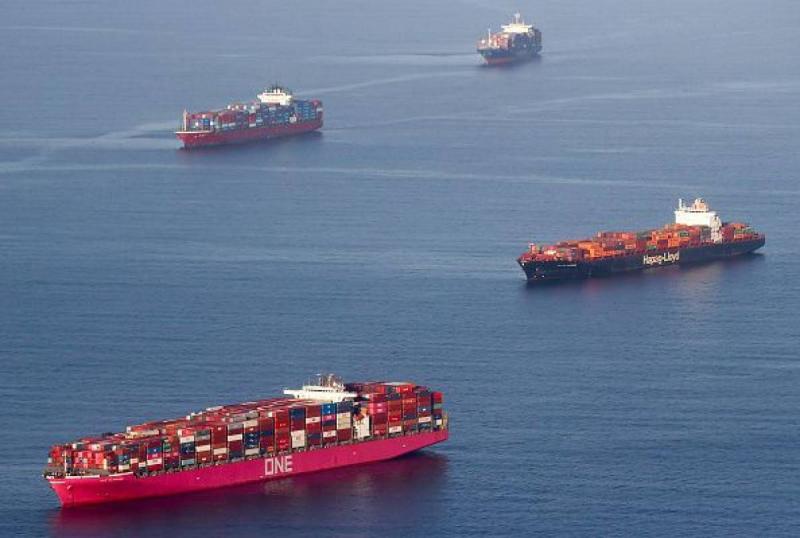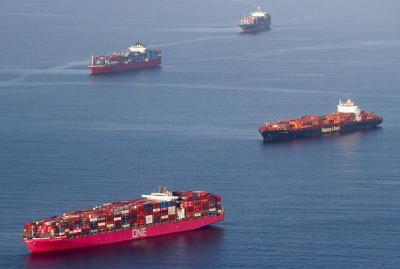Under the title "Global Economy in Graphs: Supply Chain Bottlenecks Soaring Prices," Bloomberg reported that pressures on supply chains have led to port congestion around the world, contributing to continued price increases. The report stated, "Truck journeys around the most congested ports in the United States reveal long waiting times, while the congestion rate of container ships off the coast of Singapore has increased by 10.5 percentage points above the usual level. This has resulted in rising food prices globally, in addition to further increasing the inflation rate."
In the United States, employment rose in October at a rate exceeding expectations, confirming the Federal Reserve's decision this week to begin tapering bond purchases. The central banks in both the Czech Republic and Poland have raised their key interest rates to combat rising inflation rates, while the Bank of England and the Bank of Norway maintained their positions.
Below are some graphs from Bloomberg's agency this week regarding the latest developments in the global economy:
**United States**
The U.S. labor market successfully returned to its healthy path last month, achieving a broad increase in employment of 531,000, surpassing expectations. This data paints a brighter picture of the labor market than previously thought, as declining COVID-19 cases alongside rising wages have helped employers fill vacancies that were approaching record levels. This data also supports the Federal Reserve's decision this week to begin tapering bond purchases that were enacted during the COVID-19 pandemic to keep borrowing costs very low.
On another note, fertilizer prices have surged, as rising natural gas costs have forced some European manufacturing plants to halt or reduce production. There are also concerns that rising prices may force farmers to scale back their purchases or shift more acres to crops that require less fertilizer. A decrease in yields could lead to rising crop prices, resulting in a worsened food price inflation.
Truck journeys at the most congested ports in the U.S. show increasing waiting times, which is another indicator of supply chain congestion hitting American transport hubs. Over the past year, trucks have recorded a waiting time of one day per truck, compared to 21.5 hours in 2020 and 17 hours per truck in 2019.
**Europe**
The Czech central bank raised borrowing costs by 125 basis points to 2.75%, marking the largest increase in nearly a quarter-century. The Polish central bank governor pledged to do "whatever it takes" after his institution raised the key interest rate by 75 basis points to 1.25%. Despite this, policymakers in the West have been more hesitant this week, as the Bank of England kept interest rates unchanged, defying market expectations. Norway also maintained its position but emphasized that it might increase borrowing costs by the end of the year.
**Asia**
The Delta variant outbreak has hit 19 out of 31 provinces in mainland China as of last Wednesday, marking the widest spread of infections recorded in the country since it managed the initial outbreak in Wuhan in late 2019. The highly infectious strain of the virus repeatedly breaches barriers more than previous strains, forcing Beijing to respond more aggressively and implement increasingly life-disrupting measures in the world's second-largest economy. The pace of the outbreak is accelerating in Europe as colder temperatures have led to increased community interactions indoors.
A statement from the Chinese government urging local authorities to ensure sufficient food supplies for winter and advising people to stockpile some basic necessities sparked discussions of concern online, as people linked it to the ongoing COVID-19 outbreak, a potential sudden cold wave, or even rising tensions in relations with Taiwan.
**Emerging Markets**
Inflation rates continued to rise in October, adding pressure on the Central Bank of Russia to take measures to raise key interest rates in December significantly. The Consumer Price Index rose by 8.1% in October, recording its highest level since early 2016, exceeding analysts' average expectations of 8%. Food prices jumped by 10.1%, while the core inflation index also increased.
**Globally**
The global economy faced significant jolts last year and is now caught in one of the largest congestion crises in history. Recent indicators developed by "Bloomberg Economics" highlight the severity of this problem, along with the failure to find a quick solution and how the worsening of the 2021 crisis continues in certain regions worldwide.
The congestion at major ports around the globe illustrates the state of supply chains struggling to avoid unprecedented traffic jams, with shipping professionals seeking faster ways to move goods between blocked trade routes. Singapore recorded 17 waiting ships, which is above the normal level, decreasing from a peak of 53 ships last Monday, resulting in a congestion rate of 48.2%, or a 10.5 percentage point increase above the average.




